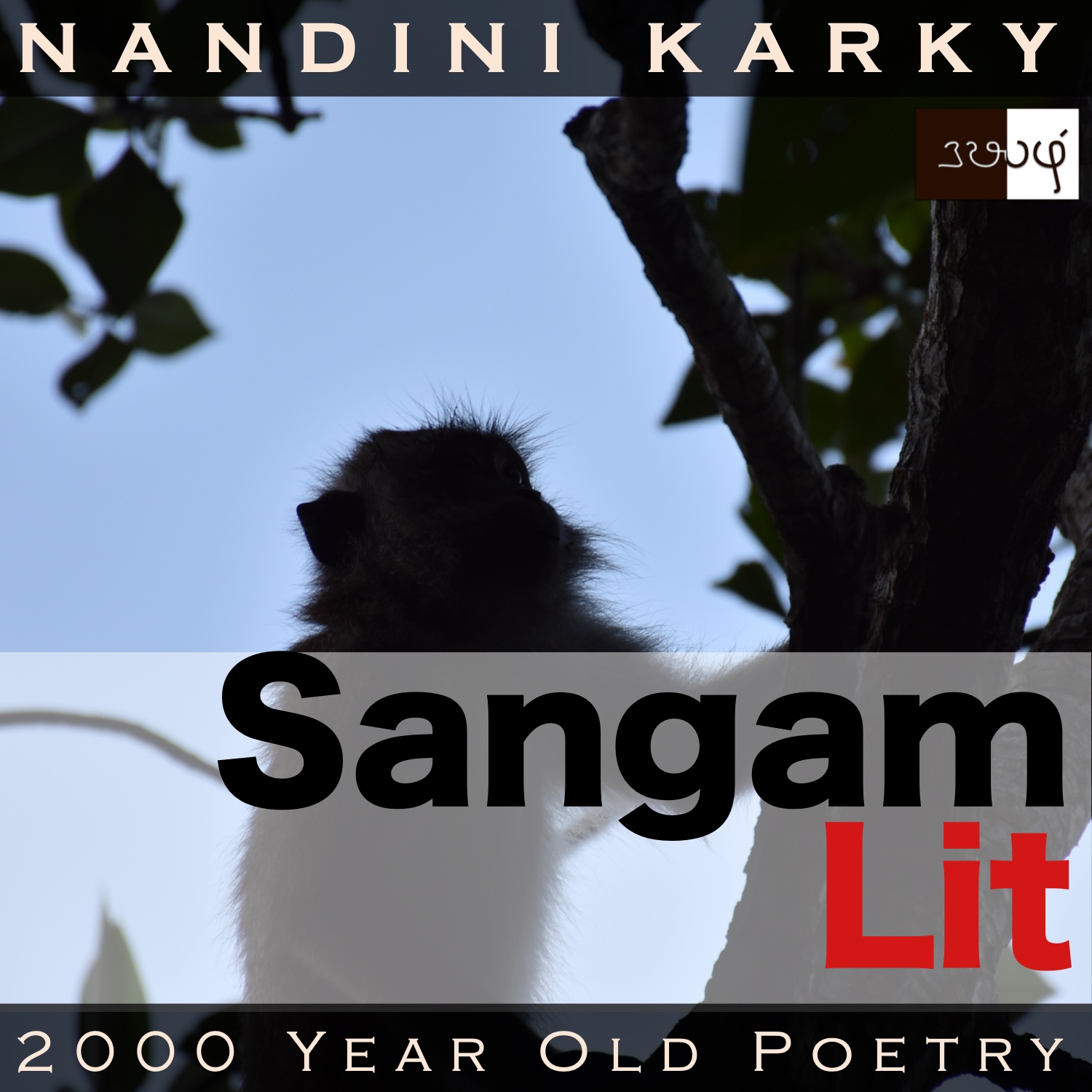Podcast: Play in new window | Download
Subscribe: Apple Podcasts | Spotify | Amazon Music | Android | iHeartRadio | TuneIn | RSS | More

In this episode, we listen to words of disappointment, as depicted in Sangam Literary work, Kurunthogai 278, penned by Peri Sathanaar. Set in the drylands of ‘Paalai’, the verse speaks in the voice of the lady to the confidante, expressing her angst at the man’s lack of care as he remains parted away.
உறு வளி உளரிய அம் தளிர் மாஅத்து
முறி கண்டன்ன மெல்லென் சீறடிச்
சிறு பசும் பாவையும், எம்மும், உள்ளார்
கொடியர் வாழி-தோழி!-கடுவன்
ஊழுறு தீம் கனி உதிர்ப்ப, கீழ் இருந்து,
ஏர்ப்பன ஏர்ப்பன உண்ணும்
பார்ப்புடை மந்திய மலை இறந்தோரே.
‘He thinks not’ is the core thought! The opening words ‘உறு வளி உளரிய அம் தளிர் மாஅத்து’ meaning ‘the mango tree’s leaves shaken by strong winds’ paint of portrait of the timeless conversation between the wind and a tree. A doll that we recently came across in Kurunthogai 276 plays a cameo here in ‘சிறு பசும் பாவை’ meaning ‘little green doll’, most probably made of coco-grass. Then, a family of monkeys delight us in ‘கடுவன்’ meaning ‘male monkey’ and ‘பார்ப்புடை மந்தி’ meaning ‘a female monkey with little ones’. Ending with the words ‘மலை இறந்தோரே’ meaning ‘the one who parted to the mountains’, the verse beckons us to listen with empathy.
What could dolls and monkeys have to do with the man’s parting? The context reveals that the man and lady were leading a love relationship when the man parted away to gather wealth. The lady languishes in his absence and when the confidante asks her to bear better with the man’s parting, the lady says to her, “When gusty winds shake the mango tree’s delicate sprouts, like its tender leaves appear the soft and small feet of my little, green doll. Neither does he think of the doll nor me. He is hardhearted, my friend, may you live long! As the male monkey sheds sweet and ripe fruits atop, from down below, selecting just the right ones, the female monkey and its infants savour it, in the mountains that he parted away to!”. With these words, the lady conveys to the confidante that the man seems heartless from her perspective.
Is the lady right in thinking about the man so? Let’s delve into her words and learn more. Instead of talking about herself or the man, the lady talks about a mango tree, whose sprouts are dancing in the wind, and then she zooms on to the fresh, new leaves of the tree to say that’s how the little feet of her green doll looks like. Yet again, we come across a woman in love talking about a doll. As we have seen in the earlier poem, this is possibly the man’s gift to the lady during their courtship. The lady continues saying the man seemed to have no space in his mind either for this doll or for herself. And so declares the man to be a cruel person. Then, she goes on to describe the place where he walks now – the mountains, where a male monkey seems to be rustling the high branches of a tree, for the benefit of its mate and little ones below, to receive the choicest of the ripe fruits above.
In that scene of the male monkey shedding fruits for its mate and little ones below, the lady places a metaphor for the absence of the same caring attribute in the man. Perhaps, the doll was perceived as their inanimate child by the man and lady during their romance, and now, as the man had left the lady, she decides that he cares not for her. As a poetic device, the scene of the male monkey working for its family below seems like a negative metaphor, describing an attribute that’s not there in the man, perhaps a wish for how he should be, on the lady’s part. Now, zooming on to the lady’s declaration about the man’s hardheartedness, it echoes the lady’s total preoccupation about the man and his activities, and that is the root cause of the problem here. It makes me want to ask why were the women then presented as such whining creatures, who did not have a life beyond their men? Was it reality or was it a ruse on the part of these ancient poets? While the answers to these questions seem elusive, we can remain watchful about these tendencies today. Instead of falling into the trap of obsessing over a partner’s path, we can see that joy and confidence arises from carving a clear path for oneself, and striving to be the best that one can be!




Nice mam. ஆண்களுக்கு இணையாக வேட்டையாடி வாழ்ந்த பெண்ணை, மொழியும் எழுத்தும் வந்தபின்னர், பெண்கள் இப்படித்தான் இருக்கவேண்டும், ஆண்களை காதலித்துக்கொண்டே இருப்பதும், ஏங்குவதும் தான் அவர்கள் வேலை என்றவாறு படைத்துப் படைத்து அவர்கள் மூளைகளை சலவை செய்து பல நூறு ஆண்டுகளாக அடக்கி வைத்தது கவிஞர்கள் சூச்சிதான்.
அழமான அறிவார்ந்த சிந்தனை.எதிரொலிக்கு நன்றி.